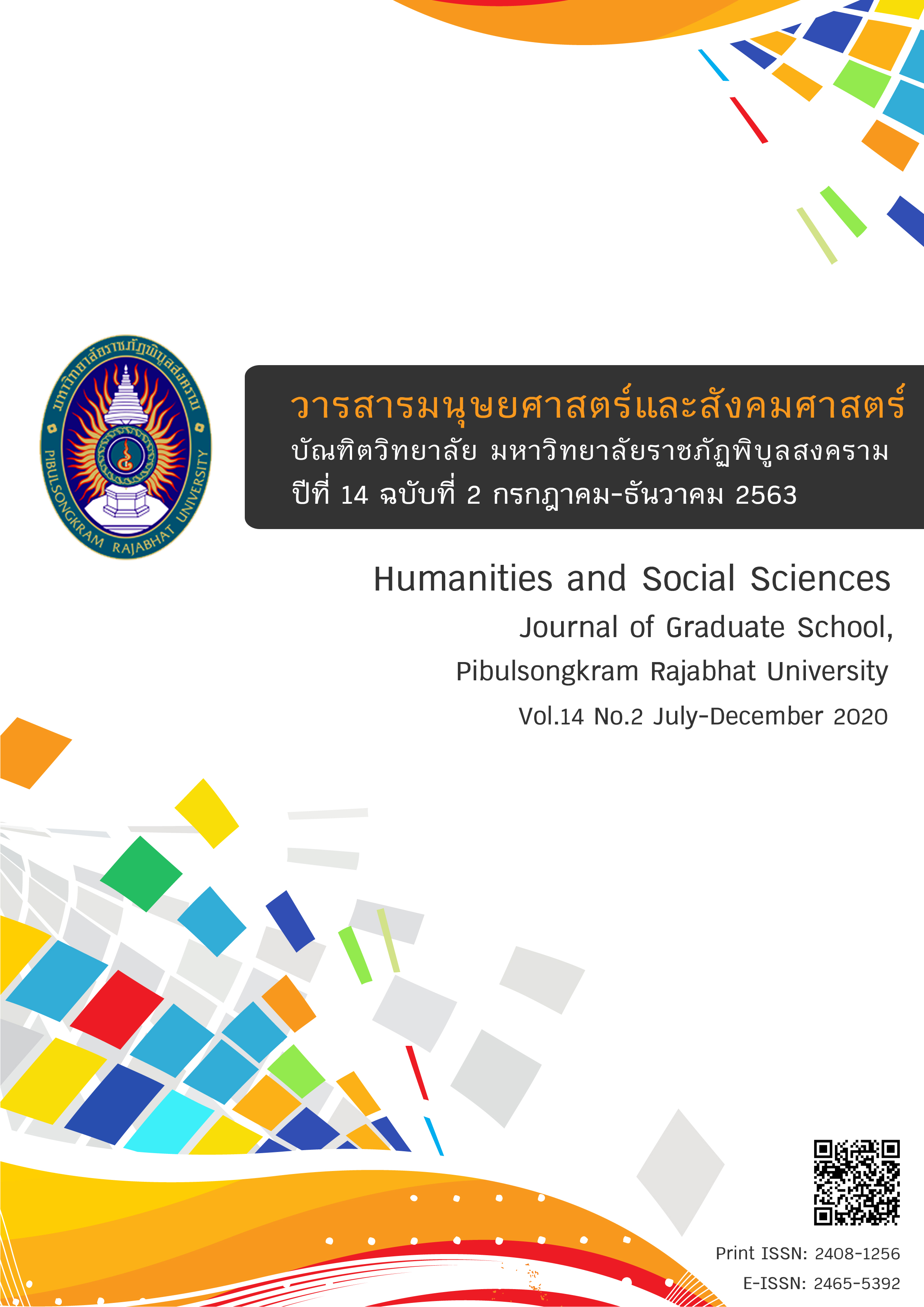The Development of Promotion Operations Strategies for Community Welfare Fund in Tak Provice
Keywords:
Strategy development, Promoting the operation, Community Welfare FundAbstract
The aims of this research were: 1) to study the problems and related factors of the Community Welfare Fund’s operation, 2) to develop strategies for promoting the operations, and 3) to evaluate strategies for promoting the Community Welfare Fund’s operations in Tak Province. Research and development process were carried out into three steps: step 1 studying the problem conditions and related factors in the operation by utilized questionnaire surveying with 68 fund officials, 380 fund members and by focus group discussion with 17 members of the fund’s management committee, responsible persons and representative members; Step 2 developing strategies of the operations promotion by studying the best practices of three successful community welfare funds. Then, drafting the strategy for promoting operations by the workshop with 21 fund-related parties and examining the quality of drafting strategies by nine experts of expert-based seminars. Step 3 Evaluating the result of the operation promotion strategies of the community welfare fund in Tak Province. The questionnaire was used to collect data from 17 experts of community welfare and strategy development-oriented, and utilized percentage, mean, standard deviation and content analysis. The results revealed that the fund has a moderate level of problems in all aspects. Internal factors affected the operation of the fund are at a high-level, which include finance, management, board, members, structure, and materials. External factors affected the operation of the fund are at a high-level, which include social and cultural factors, and politics and law. The factors affected the operations of the fund at a moderate level are technology and the economy. The developed strategies for operation promotion of the community welfare fund in Tak Province comprised vision, mission, objectives, strategic issues, and 7 strategies. The strategy evaluation results were found that the quality meets the criteria in terms of consistency, suitability, feasibility and acceptance.
References
กระทรวงพัฒนาสังคมและความมั่นคงของมนุษย์. (2559). รายงานการศึกษาการพัฒนาองค์ความรู้เพื่อการเข้าถึงสวัสดิการสังคมของประชาชน. กรุงเทพฯ: โรงพิมพ์เดือนตุลา.
ณรงค์ เพ็ชรประเสริฐ. (2547). สวัสดิการสังคมฉบับชาวบ้าน แนวคิด นโยบาย แนวปฏิบัติ. กรุงเทพฯ: เอดิสัน เพรส โปรดักส์.
ธิดารัตน์ พรหมประสงค์. (2554). แนวทางการพัฒนากองทุนสวัสดิการชุมชนตำบลควนศรี อำเภอบ้านนาสาร จังหวัดสุราษฎร์ธานี (การค้นคว้าอิสระรัฐประศาสนศาสตรมหาบัณฑิต). มหาวิทยาลัยขอนแก่น, ขอนแก่น.
นิตยา ดอกไม้, รัดเกล้า เปรมประสิทธิ์, สุกิจ ขอเชื้อกลาง และสุทธิชัย ยังสุข. (2558). การบริหารจัดการกองทุนสวัสดิการชุมชนเชิงกลยุทธ์ กรณีศึกษา : กองทุนสวัสดิการชุมชนตำบลพรหมพิราม อำเภอพรหมพิราม จังหวัดพิษณุโลก. สักทอง : วารสารมนุษยศาสตร์และสังคมศาสตร์, 20(3), 1-14.
บุญทวงศ์ เจริญผลิตผล. (2560). รายงานผลการวิจัยเชิงปฏิบัติการแบบมีส่วนร่วมจัดตั้งกองทุนเครือข่ายสวัสดิการชุมชนจังหวัดตาก. ตาก: สำนักงานพัฒนาสังคมและความมั่นคงของมนุษย์จังหวัดตาก.
ปียานุช ปันยัง. (2557). การเสริมสร้างให้กองทุนสวัสดิการชุมชนมีความเข้มแข็ง : จังหวัดลำพูน (วิทยานิพนธ์รัฐประศาสนศาสตรมหาบัณฑิต). มหาวิทยาลัยราชภัฏเชียงใหม่, เชียงใหม่.
พรปวีณ์ คำตาพันธ์. (2557). การบริหารจัดการกองทุนสวัสดิการชุมชนตามแนวคิดวงจรคุณภาพ PDCA ในตำบลสบบง อำเภอภูซาง จังหวัดพะเยา (วิทยานิพนธ์รัฐประศาสนศาสตรมหาบัณฑิต). มหาวิทยาลัยราชภัฏเชียงราย, เชียงราย.
สถาบันพัฒนาองค์กรชุมชน (องค์การมหาชน). (2556). คู่มือการดำเนินงานสวัสดิการชุมชน. กรุงเทพฯ: ส่วนประชาสัมพันธ์สถาบันพัฒนาองค์กรชุมชน (องค์การมหาชน).
สมคิด บางโม. (2552). องค์การและการจัดการ. กรุงเทพฯ: วิทยพัฒน์.
สุพานี สฤษฎ์วานิช. (2553). การบริหารเชิงกลยุทธ์ : แนวคิดและทฤษฎี (พิมพ์ครั้งที่ 3). กรุงเทพฯ: มหาวิทยาลัยธรรมศาสตร์.
สุวัฒน์ คงแป้น. (2558, 7 กันยายน). พัฒนากองทุนสวัสดิการชุมชนตามแนว ดร.ป๋วย. เนชั่นสุดสัปดาห์, น. 54.
เอกชัย บุญยาทิษฐาน. (2553). คู่มือวิเคราะห์ SWOT อย่างมืออาชีพ : จุดเริ่มต้นของยุทธ์ศาสตร์ที่ไม่ทำไม่ได้. กรุงเทพฯ: ปัญญาชน.
Downloads
Published
How to Cite
Issue
Section
License
Any articles or comments appearing in the Journal of Humanities and Social Sciences, Rajabhat Phibulsongkram University, are the intellectual property of the authors, and do not necessarily reflect the views of the editorial board. Published articles are copyrighted by the Journal of Humanities and Social Sciences, Rajabhat Phibulsongkram University.









